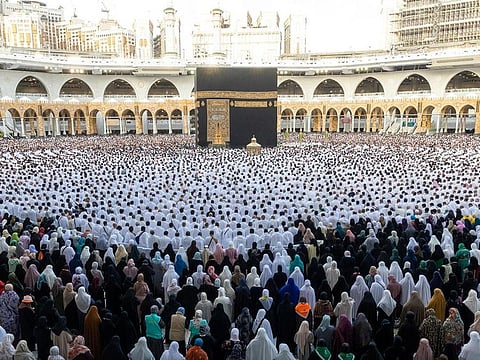Eid celebrated across Middle East with feasts and family visits
Festival ushers in a day of prayers and joy for Muslims around the world

Beirut: Eid Al Fitr ushered in a day of prayers and joy for Muslims around the world on Friday. The celebration was marred by tragedy amid the explosion of conflict in Sudan, while in other countries it came against the backdrop of hopes for a better future.
After the Ramadan month of fasting, Muslims celebrate Eid Al Fitr with feasts and family visits.
Muslims across Saudi Arabia performed Eid prayer in the early hours of Friday, the Saudi press agency SPA reported, as “worshipers flocked to fully prepared mosques and open-air spaces throughout the Kingdom to perform the prayer.”
In Jerusalem, thousands of faithful gathered at Islam’s third holiest shrine, the Al Aqsa Mosque compound, where tensions with Israeli authorities have seethed in the past month.
Following prayers, a clown entertained children and a woman painted the cheek of a girl with the green, red, black and white Palestinian flag.
The streets of Arab capitals of Damascus, Baghdad and Beirut were crowded with worshippers heading to mosques and cemeteries. Many Muslims visit the graves of their loved ones after the early morning prayer on the first day of Eid. Visitors toted bouquets of flowers, jugs of water for plants, and brooms to clean gravestones.
“After the Eid prayer we always visit our dead … to pray and pay our respects, may God have mercy and forgive them on this blessed day,” said Atheer Mohammad in Baghdad’s Azamiya cemetery.
In Turkey and Syria, many are still mourning loved ones lost in the devastating 7.8-magnitude earthquake that struck the two countries on Feb. 6, killing more than 50,000 people.
Turkish President Recep Tayyip Erdogan on Friday performed morning Eid prayers at Hagia Sophia, the 6th century Byzantine church in Istanbul that was turned into a mosque in the 15th century. It became a museum in 1934 and was reconverted into a mosque three years ago.
Erdogan, who is facing elections next month amid an economic crisis and the fallout of the earthquake, handed out chocolate and pastries to journalists outside the mosque, renamed Holy Ayasofya Grand Mosque.
This year, Saudi Arabia and many other Arab countries began their Eid celebrations on Friday, while Iran, Pakistan and Indonesia, among others, set the first day of the holiday for Saturday.
In Sudan, the holiday was eclipsed by a week of raging battles between the army and its rival paramilitary force, which are locked in a violent struggle to control the country. The fighting has killed hundreds of people and wounded thousands.
In a video message released early Friday, his first speech since the fighting broke out, Sudan’s top general Gen. Abdul Fattah Burhan marked the somber tone of the holiday. “Ruin and destruction and the sound of bullets have left no place for the happiness everyone in our beloved country deserves,” he said.
Yet in other parts of the region, the recent rapprochement between arch-rivals Saudi Arabia and Iran has kindled hopes for peace.
In Yemen, the Saudi-Iranian rapprochement raised the possibility for an end to the civil war that had turned into a proxy conflict and torn the impoverished country apart since 2014.
Saudi officials and Iran-backed Houthi rebels recently began talks in Yemen’s capital of Sanaa. During the last days of Ramadan, the warring sides exchanged hundreds of prisoners captured during the conflict.
However, the moment of hopes was marred by a stampede late Wednesday at a charitable event in the rebel-held capital that killed at least 78 people and injured 77.
In Afghanistan’s Kabul, where worshippers gathered under the watchful eyes of its Taliban rulers, 35-year-old Abdul Matin said, “I wish that besides security we had good income and good jobs. Unfortunately people can’t afford to buy all their necessities at this difficult time.”
Sign up for the Daily Briefing
Get the latest news and updates straight to your inbox

